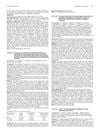 1 citations,
April 2020 in “Plastic and Aesthetic Nursing”
1 citations,
April 2020 in “Plastic and Aesthetic Nursing” PRP therapy might help increase hair growth for nonscarring alopecia, but more research is needed to confirm its effectiveness.
 May 2024 in “Journal of Education, Health and Sport”
May 2024 in “Journal of Education, Health and Sport” Current treatments for folliculitis decalvans include antibiotics, isotretinoin, and potential new therapies like botulinum toxin A and PRP.
 April 2024 in “Frontiers in medicine”
April 2024 in “Frontiers in medicine” Alopecia Areata significantly lowers quality of life and current treatments are inadequate, highlighting a need for better therapies and standardized treatment protocols.
 April 2024 in “Dermatology and therapy”
April 2024 in “Dermatology and therapy” There are significant gaps and inconsistencies in diagnosing and treating alopecia areata in Greece and Italy.
 February 2024 in “International neuropsychiatric disease journal”
February 2024 in “International neuropsychiatric disease journal” Alopecia areata severely impacts quality of life, mental health, and work productivity.
 January 2024 in “Dermatology practical & conceptual”
January 2024 in “Dermatology practical & conceptual” Male gender and family history predict alopecia areata recurrence.
 December 2023 in “Dermatology and therapy”
December 2023 in “Dermatology and therapy” Japanese patients and physicians often disagree on the severity of Alopecia Areata and treatment satisfaction, needing better communication and treatments.
 July 2023 in “Research Square (Research Square)”
July 2023 in “Research Square (Research Square)” Certain gut bacteria may protect against alopecia areata, while others may increase the risk.
 June 2023 in “Dermatology and therapy”
June 2023 in “Dermatology and therapy” The Middle East and Africa need better data, treatment consensus, and support for Alopecia Areata.
 May 2023 in “Dermatology and therapy”
May 2023 in “Dermatology and therapy” The document concludes that identifying the cause of eyebrow and eyelash loss is key to treating it and improving quality of life.

There are many treatments for common hair loss, but more trials are needed to decide which are best.
 April 2023 in “Medizinische Genetik”
April 2023 in “Medizinische Genetik” New research has found 14 genes linked to the risk of developing alopecia areata, improving understanding and treatment options.
 January 2023 in “International journal of homoeopathic sciences”
January 2023 in “International journal of homoeopathic sciences” The document says homoeopathic treatments are good for hair regrowth in alopecia areata but doesn't give proof.
 October 2022 in “Journal of experimental and clinical medicine”
October 2022 in “Journal of experimental and clinical medicine” Repurposing existing drugs for COVID-19 shows promise but requires more research to confirm effectiveness.
 June 2020 in “Journal of Investigative Dermatology”
June 2020 in “Journal of Investigative Dermatology” Getting insurance to cover the hair loss treatment tofacitinib is hard because it's not officially approved for that use.
 June 2020 in “Journal of Dermatological Treatment”
June 2020 in “Journal of Dermatological Treatment” Use telemedicine and strict hygiene for safe hair and scalp treatments during COVID-19.

The document concludes that diagnosing female hair loss requires careful examination, with treatments varying by condition and psychological support often necessary.
 July 2018 in “Elsevier eBooks”
July 2018 in “Elsevier eBooks” The most common cause of hair loss in children is tinea capitis, followed by alopecia areata and telogen effluvium.
 July 2018 in “Elsevier eBooks”
July 2018 in “Elsevier eBooks” Up to half of people experience itchy scalp, often due to skin conditions like seborrheic dermatitis or psoriasis, and treatments vary based on the specific cause.
 June 2017 in “Poster presentations”
June 2017 in “Poster presentations” All four treatments for early rheumatoid arthritis had similar safety profiles.
 April 2024 in “Dermatology and therapy”
April 2024 in “Dermatology and therapy” In Denmark from 1995 to 2016, hospital-treated alopecia areata cases increased, mostly affecting women and those over 50.
 March 2024 in “Clinical and experimental dermatology”
March 2024 in “Clinical and experimental dermatology” Topical corticosteroids may be a safe and effective treatment for severe alopecia areata in children.
 February 2024 in “International journal of medical science and clinical research studies”
February 2024 in “International journal of medical science and clinical research studies” CCCA is a scarring hair disorder mainly affecting people of African descent, needing better awareness and treatment.
 January 2024 in “Journal of applied biological chemistry”
January 2024 in “Journal of applied biological chemistry” Glehnia littoralis and Andrographis paniculata extracts can significantly boost hair growth.
 December 2022 in “Scholars journal of applied medical sciences”
December 2022 in “Scholars journal of applied medical sciences” Dutasteride 0.5mg improves hair growth in 78% of people with hair loss, but may cause sexual problems in some.
 1 citations,
December 2021 in “JAAD case reports”
1 citations,
December 2021 in “JAAD case reports” A woman with severe hair loss saw significant hair regrowth after adding platelet-rich plasma injections to her treatment with tofacitinib.
 6 citations,
February 2023 in “Advances in Therapy”
6 citations,
February 2023 in “Advances in Therapy” Baricitinib, a drug for rheumatoid arthritis, atopic dermatitis, and alopecia areata, is generally safe with low risk of major side effects, even in patients with risk factors. It's also effective in promoting hair regrowth in alopecia areata patients.
 2 citations,
August 2022 in “JAAD case reports”
2 citations,
August 2022 in “JAAD case reports” COVID-19 vaccines may rarely worsen hair loss in people with severe alopecia, but the benefits of vaccination still outweigh this risk.
January 2024 in “Pharmacoepidemiology” Patients with rheumatoid arthritis using tofacitinib had more serious side effects than those with alopecia areata.
20 citations,
December 2021 in “Journal of the American Academy of Dermatology” Continuous treatment with ritlecitinib and brepocitinib is needed to maintain hair regrowth in alopecia areata.




























